-
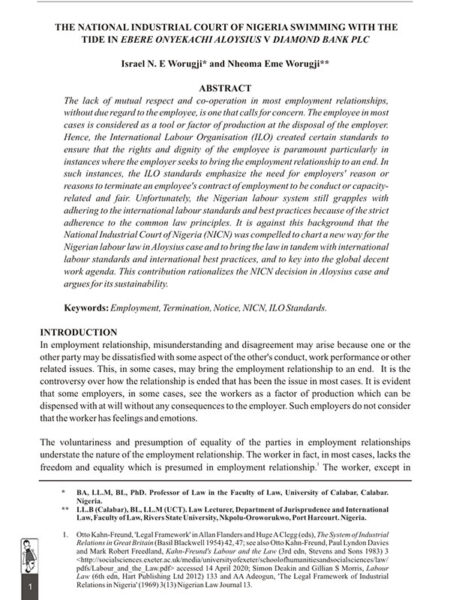
The National Industrial Court of Nigeria Swimming with the Tide in Ebere Onyekachi Aloysius V Diamond Bank Plc
0₦2,500.00Professor Israeli Worugji of the University of Calabar, Nigeria and Nheoma Worugji of the Rivers State University, Nkpolu-Oroworukwo Port Harcourt Nigeria, in their article, The National Industrial Court of Nigeria Swimming with the Tide in Ebere Onyekachi Aloysius V. Diamond Bank, note that ordinarily, an employer has the freedom to terminate the employment of an employee upon due notice and regardless of motive. The National Industrial Court of Nigeria (NICN) in a recent decision, however, seems to have limited the employer’s otherwise open-ended power to bring the contract of employment to an end. In Aloysius case, the NICN, relying on international labour standards and its new mandate under the Constitution (Third Alteration) Act, decided that no termination of a contract of employment should take place unless there is a valid reason connected with the capacity or conduct of the employee or based on the operational requirements of the establishment.Professor Israel Worugji and Nheoma Worugji review the Aloysius the case against the background of the common law and statutory provision on termination of employment, the International Labour Organisation’s instruments and international best practices.
-
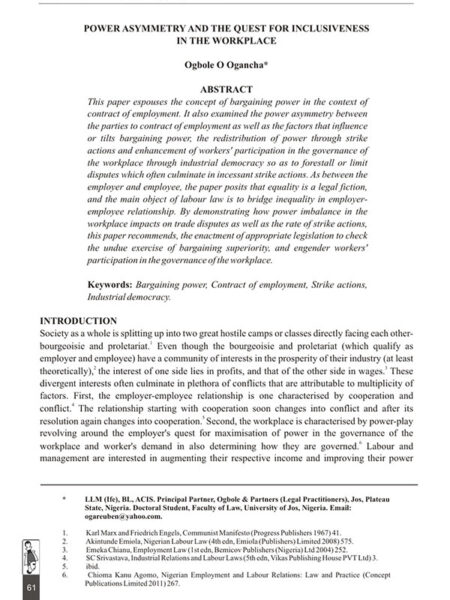
Power Asymmetry and the Quest for Inclusiveness in the Workplace
0₦2,500.00Ogbole Ogancha of Ogbole & Partners and Doctoral Candidate, Faculty of Law, University of Jos Nigeria inPower Asymmetry and the Quest for Inclusiveness in the Workplace, examines the concept of bargaining power in the context of the contract of employment. He considers the power imbalance between the parties to a contract of employment as well as the factors that influence or tilts bargaining power, the redistribution of power through strike actions and enhancement of workers’ participation in the governance of the workplace. Ogbole argues that equality in labour relations is a legal fiction, and the main object of labour law is to bridge inequality in the employer-employee relationship. Aside from demonstrating how power imbalance in the workplace impacts on trade disputes as well as the rate of strike actions, he recommends the enactment of appropriate legislation to check the undue exercise of bargaining superiority to engender workers’ participation in the governance of the workplace.
-
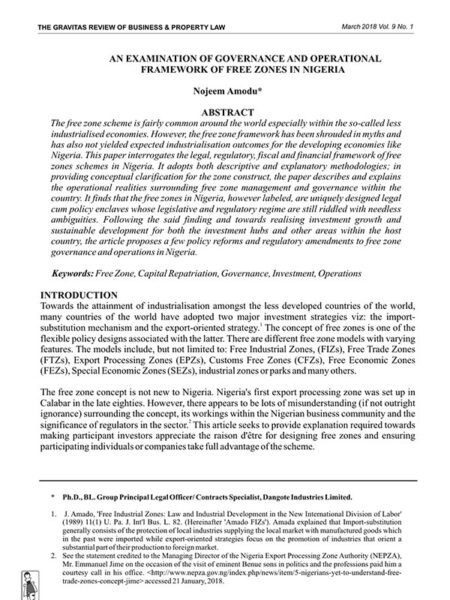
An Examination of Governance and Operational Framework of Free Zones in Nigeria
0₦2,500.00Dr. Nojeem Amodu, Group Principal Legal Officer with Dangote Industries Limited, in “An Examination of Governance and Operational Framework of Free Zones in Nigeria”,interrogates the legal, regulatory, fiscal and financial framework of free zones schemes in Nigeria. He notes different free zone models including Free Industrial Zones, Free Trade Zones, Export Processing Zones, Customs Free Zones, Free Economic Zones, Special Economic Zones among others. He considers the reasons for delineation of zones, licensing and incentive regimes of free zones in Nigeria, registration procedure and examines all sides of the argument in the debate on the conflict between the Nigeria Export Processing Zones Act (NEPZA) and the Oil and Gas Export Free Zone Authority Act (OGEFZA).
-
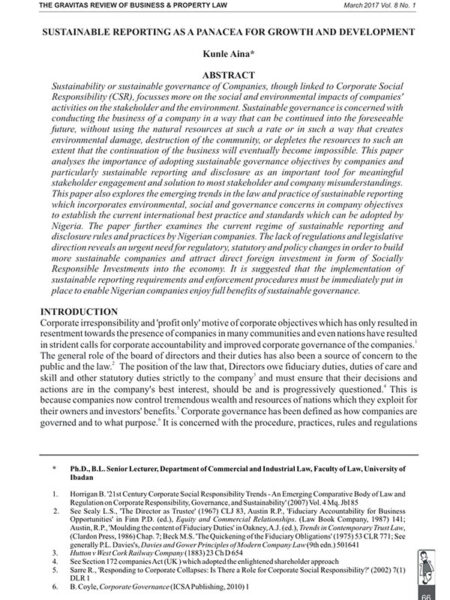
Sustainable Reporting as a Panacea for Growth and Development
0₦2,500.00Dr Kunle Aina of the Department of Commercial and Industrial Law, University of Ibadan in his article “Sustainable Reporting as a Panacea for Growth and Development” examines the concept of Sustainable Reporting, which is reporting the social and environmental impact of corporate activities on stakeholders and the environment. He analyses the importance of adopting sustainable governance objectives by companies and particularly sustainable reporting and disclosure as an important tool for meaningful stakeholder engagement and solution to most stakeholder and company misunderstandings. He reviews international best practices on Sustainable Reporting and bemoans the legislative and regulatory framework for sustainable governance and reports in Nigeria which are so scanty as to be classified as non-existent.
-
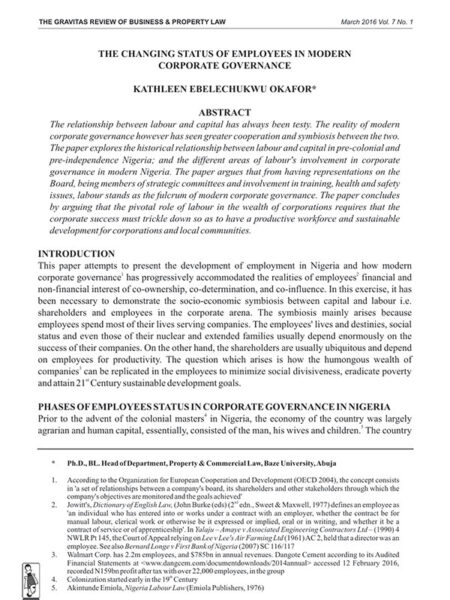
The Changing Status of Employees in Modern Corporate Governance
0₦2,500.00Dr Kathleen Okafor, Head, Department of Property & Commercial Law, Baze University, Abuja examines “The Changing Status of Employees in Modern Corporate Governance». She posits that modern corporate governance has seen greater cooperation and symbiosis between labour and capital which has accommodated the realities of employees’ financial and non-financial interest of co-ownership, co-determination, and co-influence. She explores the different areas of employees’ involvement in corporate governance and concludes that the pivotal role of labour in the wealth of corporations requires that the corporate success must trickle down for sustainable development of corporations and local communities.
-
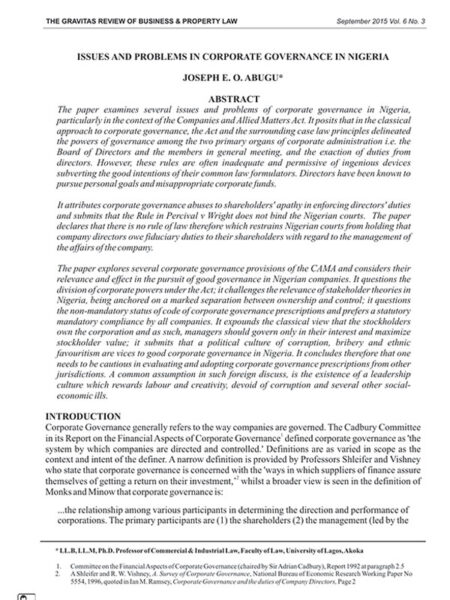
Issues and Problems in Corporate Governance in Nigeria
0₦2,500.00Joseph Abugu, Professor of Commercial and Industrial Law, University of Lagos, Akoka, in his article “Issues and Problems in Corporate Governance in Nigeria” examines the problem of Corporate Governance in Nigeria and argue that in an environment of corruption, bribery and ethnic favouritism, adopting corporate governance codes informed by experiential evolution of other cultures could be counterproductive.
The Gravitas Review of Business & Property Law



